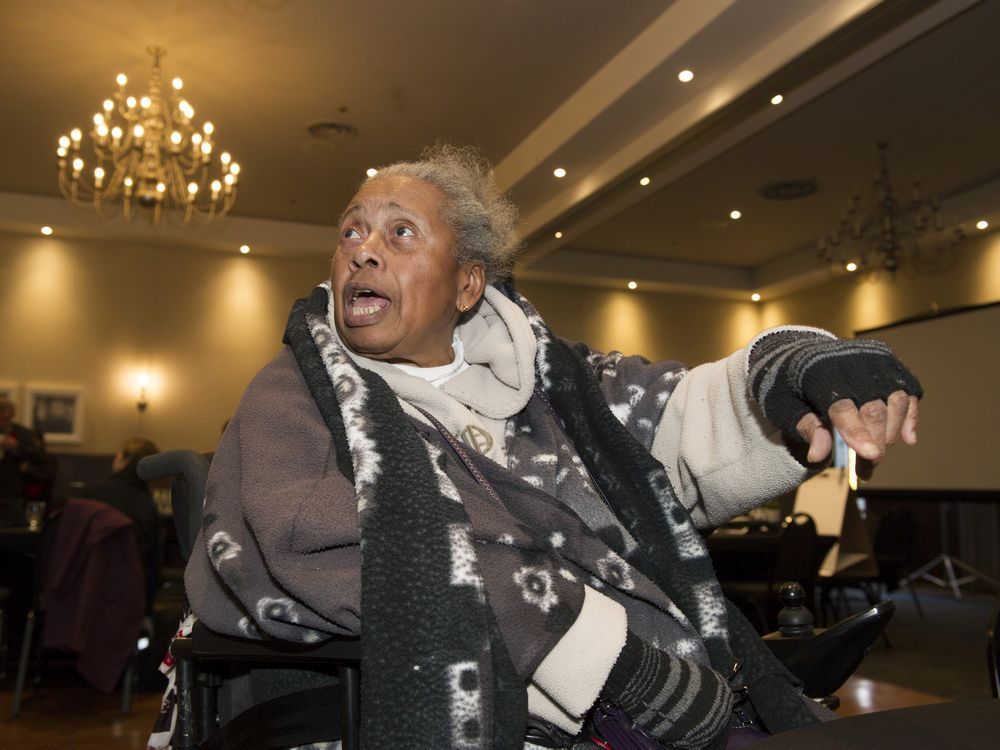British Columbians pack meeting to help develop accessibility law

Credit to Author: Nick Eagland| Date: Sun, 03 Nov 2019 01:19:18 +0000
Thousands of disabled British Columbians are contributing ideas for legislation to make the province more accessible, including a large group that packed into a community meeting Saturday in Vancouver.
More than 150 people turned up for the public consultation session at a downtown hotel where Shane Simpson, Minister of Social Development and Poverty Reduction, asked them about the barriers they have experienced, what they think about framework proposed for the legislation, and how his ministry can improve it.
The province’s framework shows how the legislation could work by including standards for service delivery, employment, information and communication, and transportation, according to the document.
At Saturday’s meeting, Olive Olajide and Esther Wiens, friends who live in Vancouver, said they came to hear how the legislation is progressing and what barriers it will remove.
Olajide, 78, uses a power wheelchair and said transportation is a major issue for her. She is mostly satisfied with the accessibility of public transit in Vancouver but said newer buses have been “terrible.”
She can’t use her right arm and must rotate her wheelchair to scan her Compass card, so a second scanner left of the door would help. The buses have less space, so she suggested bus drivers be given a pre-recorded announcement to play when a person using a wheelchair needs to board or disembark.
“People get on when you’re trying to get off, everybody has to be first,” she said. “Sometimes I have to fight with people.”
Olajide lamented that many public buildings in the city do not have automatic door openers, including her doctor’s office.
Wiens, 64, said people with invisible disabilities like her tend to be ignored in discussions by government about accessibility.
She suffers illnesses such as fibromyalgia, osteoarthritis and chronic fatigue syndrome, but is not allowed to move into an accessible unit, of which there are far too few in the city, she said.
“People say, ‘Look, you look totally able-bodied, therefore you can handle stairs,’” she said. “I cannot.”
Home-support services for disabled people have also been neglected, Wiens said.
“Right now, they are geared only toward frail, elderly seniors, not physically disabled (people),” she said. “That’s a big oversight, as far as I’m concerned, because we have rights under the United Nations Convention on the Rights of Persons with Disabilities which are being totally disregarded.”
Bill Conway, from Sechelt, said he even faced barriers in the hotel on his way to the meeting with his guide dog, DA Chief, including hallways packed with trolleys.
Conway said he has visited hotels with elevators which do not have Braille labels on their buttons. Grocery and drug stores have replaced human cashiers with self-checkout machines which have touchscreens he can’t use. Businesses have refused to allow DA Chief to enter, breaking the law.
Strong enforcement is key to making the legislation work, said Conway, who is the 2nd vice-president of the Canadian Council of the Blind’s B.C.-Yukon division.
“The District of Sechelt where I live has adapted an accessibility building code and we are finally getting contractors to recognize it, but to have the government enforce it, that’s the right thing to do,” he said.
B.C.’s framework says the legislation could require an accessibility directorate responsible for overseeing progress and helping organizations comply with the legislation and standards. A standards development board could be responsible for development and revision of the standards. An accessibility commissioner could be responsible for ensuring compliance and enforcement.
Those who fail to comply could face monetary penalties. In Manitoba and Nova Scotia, the maximum fine is $250,000.
The federal government passed Canada’s first national accessibility legislation in May, meant to “identify, remove and prevent” accessibility barriers in areas that fall under federal jurisdiction. Those include built environments, federally run programs and services, banking, telecommunications and transportation that crosses provincial lines.
That legislation, however, doesn’t address barriers within provincial jurisdiction. Manitoba, Ontario, Quebec and Nova Scotia have passed accessibility laws, and Newfoundland and Labrador are developing their own, too.
But B.C. — where more than 926,000 people over the age of 15 have some form of disability — has lagged behind. The government here says the legislation would help it work with disabled people and everyone else to identify, remove and prevent barriers.
Simpson’s ministry began collecting feedback by phone, online and at public meetings on Sept. 16, 2019, to guide the development of the legislation, and will continue to do so until the end of this month.
Simpson, who is attending all 10 community meetings, said his ministry began groundwork on the legislation about a year ago, in anticipation of the federal legislation passing. They’ve received thousands of surveys since consultation began and gained valuable knowledge.
“We’re starting to hear that education probably needs to have a bigger role than we had originally thought,” said Simpson, MLA for Vancouver Hastings.
Businesses and local governments are showing that they will commit to the legislation and want it done right, he said.
“I think that the time is right to make these changes that will create an opportunity for people to have a better life, both in terms of their standard of living but also their opportunity to take advantage of all the things that you and I take advantage of every day, in our day-to-day lives, that aren’t necessarily available to people with disabilities,” Simpson said.
Simpson said he wants the legislation to be tabled in the fall of 2020.
The next in-person community meeting is in Kamloops on Nov. 12. Public consultation is open until 4:00 p.m. on Nov. 29, 2019, and details about providing feedback can be found at engage.gov.bc.ca/accessibility.
— With files from The Canadian Press
CLICK HERE to report a typo.
Is there more to this story? We’d like to hear from you about this or any other stories you think we should know about. Email vantips@postmedia.com